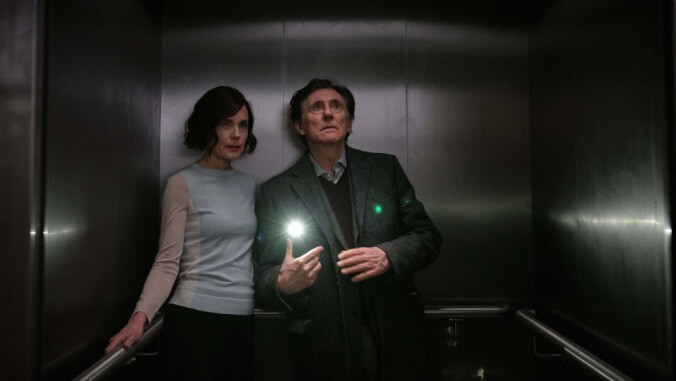Luckily, the title and source material are the only things the two productions have in common, though that’s been enough to create market confusion. Whereas the BBC production is a focused period piece—think Pride And Prejudice And Tripods—the French version, which has found a U.S. home on Epix, takes a broader, ensemble view of a hostile alien attack in modern-day England and France. It also takes far more liberties than the BBC interpretation, eschewing massive action set pieces in favor of a quiet, more deliberate story about a disparate ensemble of characters with little more in common than their desire to outlast the murderous space tourists. While it might initially disappoint anyone expecting a more propulsive sci-fi tale, Worlds settles into a compelling if derivative dystopian survival series.
The saga begins, as such genre pieces often do, with a mild-mannered scientist killing time at a remote outpost when a troublesome signal reveals itself to be more than a doodad on the fritz. Here it’s astronomer Catherine Durand (Léa Drucker) who circles the wagons after taking notice of a distant transmission too sophisticated to be a cosmic mistake. As government officials figure out how to communicate with the visitors or at least determine their intent, their plans are upended when a swarm of small spacecraft burrows into major population centers across England and France. The focus shifts to neuroscientist-turned-high school teacher Bill Ward (Gabriel Byrne), who figures out the catastrophic purpose of the craft, which is to level a passive but devastating attack on humanity that, within days, leaves the streets strewn with bodies and a fortunate few struggling to adapt to their horrifying new circumstances.
While that synopsis might sound like the stuff of rollicking genre fare, Worlds is remarkably talky, especially in the first two hours. Bill is instrumental in discovering the aliens’ deadly schemes, but he’s equally invested in patching things up with his estranged wife Helen (Elizabeth McGovern), who he essentially kidnaps to save her from the initial wave of casualties. Elsewhere, Natasha Little plays an ordinary mom fighting to protect her teenage son and daughter (Ty Tennant and Daisy Edgar-Jones, respectively), the latter of whom has a disability that plays an intriguing role as the show creeps along in its own time. In fact, the series is so deliberate, the creatures that patrol the streets to eliminate straggling humans don’t show themselves until the end of the second hour, and even then only in glimpses.
Between the laconic pace and the intense focus on characters, Worlds is an alien invasion story that doesn’t spend much time fretting about its aliens beyond the characters whose jobs involve fretting about things. It’s much more interested in how people bond and persevere through shared trauma and survival instinct, not unlike The Walking Dead or TNT’s defunct Falling Skies. The show’s visuals bear more than a passing resemblance to Black Mirror, and fans of Charlie Brooker’s anthology will either cheer or cry foul upon seeing how much the aliens’ robot enforcers look like the mechanical pit bulls from season four’s “Metalhead.” Worlds shares Black Mirror’s relentless cynicism, and while the show was created and written by Howard Overman, it lacks the irreverent tang he brought to Misfits and Crazyhead.
But like any slow burn, Worlds reveals its charms over time, once the audience has shed any expectation of Overman following Wells’ blueprint. The performances are uniformly great, with Byrne lending his patrician presence to Bill, a messy, stubborn character who would easily become abrasive in the hands of a lesser actor. Bayo Gbadamosi also stands out as Kariem, an African immigrant who becomes a reluctant hero and finds it easier to fit into the world at the end of its lifecycle.
The series also boasts smart direction from Gilles Coulier, who directs the first four episodes, and Richard Clark, who helms the last four. Coulier’s sure hand is especially helpful early on, when the story flits between the characters’ introductions while spelling out the threat they face. Perhaps the biggest liability the series has is its iconic title, which promises a leaner, more focused, and closed-end narrative. Instead, Canal and Fox have given Overman a second season, which will hopefully benefit from the relentless world and character building that, at least for now, stands in place of the blue explosions and tractor beams.




























![Rob Reiner's son booked for murder amid homicide investigation [Updated]](https://img.pastemagazine.com/wp-content/avuploads/2025/12/15131025/MixCollage-15-Dec-2025-01-10-PM-9121.jpg)












